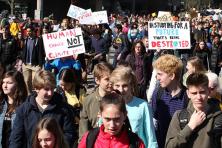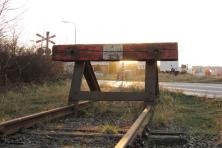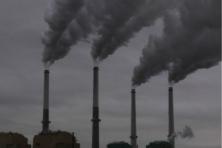The following, an excerpt of an open letter to BNSF CEO Matthew Rose, was published in Sustainable Business Oregon.
We wanted to thank you for recently visiting the Northwest. We’re sorry that we didn’t have a chance to chat about the subject that brought you to our region: coal export.
In your interview with The Columbian, you said, “we owe you as a community more information” about the impacts from proposed coal terminals on Northwest communities. We agree. We hope that you will join us in requesting an independent analysis of the impacts of these projects. Many state and local officials have commented that it is very difficult to get basic information from the railroad about volumes, routings, potential impacts or proposed mitigation of the increased coal train traffic through the region. We hope your comments mean that you will direct BNSF to engage and provide needed information to all affected communities and stakeholders. Every community affected by these proposals, from Billings to Bellingham, is very interested to get clear information on some key issues given that you intend to increase your company’s presence in our region.
Here’s what we need most from you:
Show us your math on the coal trains. We’re a bit perplexed by your assertions regarding the current five proposals in Oregon and Washington. You claimed that the estimates for coal train traffic are overstated, and that 8-16 “coal-bearing” trains per day are likely to go through the Columbia Gorge, moving between 50-100 million tons of coal per year. Presumably, those trains would have to make return trips too, so the number is double what you are suggesting (since we assume “coal-bearing” means they have coal inside the cars). Communities really need to know the likely number and length of those trains to be able to evaluate the impacts.
Level with communities about the scale of these proposals. Even 50 million tons of new coal would create a massive increase in current volumes. The railroads currently ship about 80 million tons of all freight per year to Washington and Oregon, and your estimates show a 60 percent to 120 percent increase in rail freight through affected communities. This doesn’t include increases in other traffic, including Bakken shale oil. You must do planning for capacity purposes: can you share this information so that communities can begin to plan for the impacts?
Tell us which proposals you support. BNSF has previously presented itself as a neutral bystander obligated to accept cargo from any shipper. Yet your media tour promoting coal export paints a very different picture. BNSF is a member of the coal industry group, the Alliance for Northwest Jobs and Exports. That coal-industry funded effort promotes the need for all of these terminals.
Put some numbers behind how BNSF would “help” with rail upgrades. You acknowledge that many communities would face very significant issues with traffic, emergency response and other impacts and say that you want to help these communities “work through” these issues. Will the railroad commit to helping fund the projects needed to address these impacts?
Tell us how you plan to handle the capacity increases. You have indicated that BNSF would make major improvements to accommodate the increased traffic along already bottlenecked rail segments. That sounds like an easy fix, but what about the local areas, including Bellingham and the Columbia Gorge, that would see significant impacts like double-tracking and lengthy sidings? Will you share your plans for needed improvements? To meet the massive increase in coal train traffic, do you plan to let private landowners and local officials know what property you intend to condemn for any needed expansion? If so, when?
Tell us what happens to passenger rail and other freight trains. If we begin moving massive amounts of coal by rail through the Northwest how would that impact current or anticipated increases in passenger rail service and how can the public be certain that they are not subsidizing private freight when they ride the rails? What would the impacts be on other shippers — many that are your customers — that are already having a harder time getting fair and timely access to rail service?
Keeping the coal trains on the tracks: As you know, this summer has seen a spate of coal-train derailments around the country. There have now been at least a dozen, including one in Washington state and two accidents with fatalities. These derailments can cause property destruction, pollution, congestion and even deaths. Why are so many coal trains coming off the rails? What role does coal dust and coal train traffic play in these derailments?
Give us more clarity about coal dust. BNSF spokespeople are constantly saying that the dust issue is overblown, but the studies showing it may be a significant problem come from your own website. Industry reports say that your guidelines for dust suppression aren’t being enforced or widely followed. Is this true, and what data do you have to show surfactants are working? Also, can you let communities know why coal cars are not covered? Is this because of the risk of fire and explosions, or are shippers simply unwilling to incur the costs? If coal dust is not a concern, why would Portland General Electric, a utility that operates a coal plant, decide to veto a lease deal with Kinder Morgan for the 30 million ton coal terminal adjacent to its natural gas power plant, citing coal dust (and traffic congestion) as an impairment to the operation the Port Westward plant?
Join us in supporting an area-wide and cumulative review of these five proposals.We are glad you recognize that BNSF has a responsibility to be forthcoming with local communities about the impacts of coal export. We take you at your word that BNSF wants to be a part of any solution and would help. The first step to that is ensuring local communities and stakeholders are fully aware of the full scope of the possible impacts.
As you told The Columbian, “This is a real issue. We don’t deny that eight trains a day or 10 trains a day is going to be an issue.” These communities have a right to know specificallyhow it will impact them and what steps they can take to protect their citizens and employers.
We look forward to hearing from you and would welcome the chance to meet with you and community leaders to discuss these concerns.
Sincerely,
Ross Macfarlane
Climate Solutions




